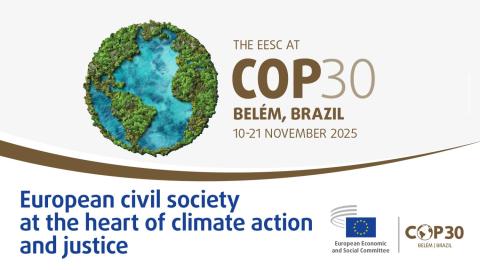European Economic
and Social Committee
Ambition deferred: COP30 keeps Paris alive but fails to deliver the fossil-fuel phase-out the world needs
The message emerging from COP30 is stark: once again, global leaders have preserved UNFCCC climate governance framework but failed to deliver the urgency demanded by science, citizens and civil society. The summit closed without an agreed roadmap to phase out fossil fuels, a decision that many observers warn leaves the world dangerously off-track for limiting warming to 1.5°C.
This mixed and ambivalent outcome has sparked divided assessments. While some point to procedural stability and incremental gains, others view the result as a missed opportunity at a moment when the climate crisis is accelerating. For the European Economic and Social Committee (EESC), which has consistently called for ambitious emissions cuts and a decisive shift away from fossil energy, the inability of COP30 to go further is a cause for deep concern. Climate justice, the Committee stresses, requires placing civil society at the centre of decision-making, yet ambition once again fell short.
Despite this, several developments offer glimmers of progress. Negotiators advanced on the Just Transition mechanism, adaptation frameworks, climate-finance commitments for adaptation, and international carbon markets. These align closely with priorities the EESC has highlighted in recent positions, from its 2023 contribution to the Just Transition Work Programme to its 2025 work on adaptation and climate finance. Meanwhile, new coalitions exploring pathways for a fossil-fuel phase-out, although informal and voluntary, provide some forward momentum as attention begins to shift toward COP31.
Beyond the formal UNFCCC negotiation track, broader climate discussions are gaining significance. The EESC delegation, led by NAT president Stoyan Tcoukanov and including its Youth Delegate, as well as members Maria Nikolopoulou and Josep Puxeu Rocamora worked throughout the summit to ensure that the voice of European civil society remained visible and influential.
The Committee co-organised two major side events: Ten Years After the Paris Agreement (with the European Parliament) and Defending the Right to a Healthy Environment (with the European Youth Forum). The latter offered a timely platform to address emerging developments in climate litigation, including the International Court of Justice’s recent Advisory Opinion on states’ obligations regarding climate change, a landmark moment that will shape the global understanding of the right to a healthy environment.
As the world looks ahead to COP31, the expectation from civil society, and the EESC, is unambiguous: the space for half-measures has closed. Only bold, science-aligned, and justice-centred climate action will be enough.(ks)
